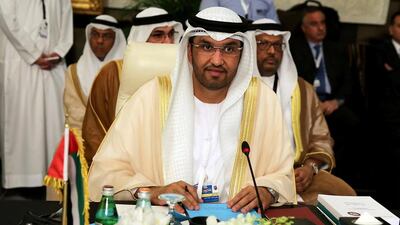BEIRUT // When leaders and senior dignitaries from the Arab world gather on the Dead Sea’s Jordanian shores this week for the 28th Arab League summit, the conflicts raging across the Middle East will top their agendas.
In Syria, a complicated civil war that has killed hundreds of thousands is now in its seventh year. Yemen’s war – which attracted the intervention of Saudi and Emirati troops – is in its third year. Iraq is on the verge of vanquishing ISIL, but more potential ethnic and sectarian conflicts loom on the horizon.
And then there is the ever present threat of Iran, and the still unsolvable Israeli-Palestinian conflict, just a few kilometres away from this year’s meeting.
But making progress on these conflicts is a tall order for an organisation that has been racked with ineffectiveness and perhaps irrelevance in recent years.
The struggle for the Arab League can be as simple as getting people to show up to its meetings.
At last year’s meeting in Nouakchott, Mauritania – dubbed the “Summit of Hope” – just seven heads of state attended. Qatar was the only major regional power to send its leader, with heavyweights like Egypt, Saudi Arabia and the UAE absent.
Decisions made at the summits can be hard to follow through on.
In 2015, the Arab League summit in Sharm El Sheikh agreed to create a joint military force to counter the conflicts ripping through the region. Two years later, this urgently needed force still appears to be only words on paper.
At this year’s gathering, Syria will weigh heavy on many and the United Nations’ special envoy for the conflict, Staffan de Mistura, will be in attendance.
The Arab League sought to be a peacemaker and mediator in the early days of the conflict by drawing up peace plans, pressuring Damascus to back away from violence and even deploying monitors to Syria.
But over the years, the grip of the Arab League and its member states on the war has gone slack.
Today, Russia, Iran, Turkey and the United States – all non-Arab powers – have troops in the country. They, not the Arab states, are seen as the key forces that will determine the future course of the conflict and the country.
At this point in the war, declarations from the Arab League – or even the UN – mean little to the factions involved on the ground in Syria unless they are backed by forces.
There still may be openings for the Arab League to get involved on Syria. The conflict has sent millions of refugees across the Arab world and countries like Lebanon – home to an estimated 1.5 million refugees – need help coping with the influx.
US president Donald Trump has proposed an extremely vague idea for civilian “safe zones” in Syria that he says Arab Gulf states will pay for. If such a move goes forward, Arab countries could potentially see a more active role inside Syria once again if they are called upon to provide protection.
While the Arab League may be relatively powerless on Syria given the situation on the ground, the organisation may be able to further mobilise against Iran and its ambitions in the region.
In recent years, the Arab League has emerged as a vehicle for anti-Iran policies, driven largely by the Arab Gulf states.
On Yemen, the Arab League stands behind the Aden-based government of president Abdrabu Mansur Hadi, which is fighting against Iran-backed Houthi rebels. And the league was quick to expel Iran ally Syria from its ranks when president Bashar Al Assad turned to bloody tactics to quell uprisings against him.
Arab League states may have their differences, but there is little pushback against countering Iran among the 22 member states. When the league moved to declare the Iran-backed Lebanese faction Hizbollah a terrorist organisation at last year’s summit, only Lebanon and Iraq – a friend of Iran – opposed the measure.
With the Trump administration promising a more confrontational line on Tehran, the Arab League could be emboldened in its statements and potential actions. Both Mr Trump’s administration and leaders in Gulf states feel that too much of the Middle East has slipped into Iranian hegemony and are eager to stop this as soon as possible.
An initiative to resolve the Israeli-Palestinian conflict is also expected to be presented at the summit, but this seems unlikely to have a major effect.
The Arab Peace Initiative calls for the normalisation of ties between Arab and Muslim countries and Israel in return for the creation of a Palestinian state along pre-1967 borders. This, however, runs into problems with Israel, which wants any diplomatic normalisation to precede discussions over territory transfers.
So long as the Palestinian territories remain divided between the Palestinian Authority in the West Bank and rival Hamas hardliners in the Gaza Strip, negotiated settlements between the Arab world and Israel will be a non-starter.
jwood@thenational.ae

